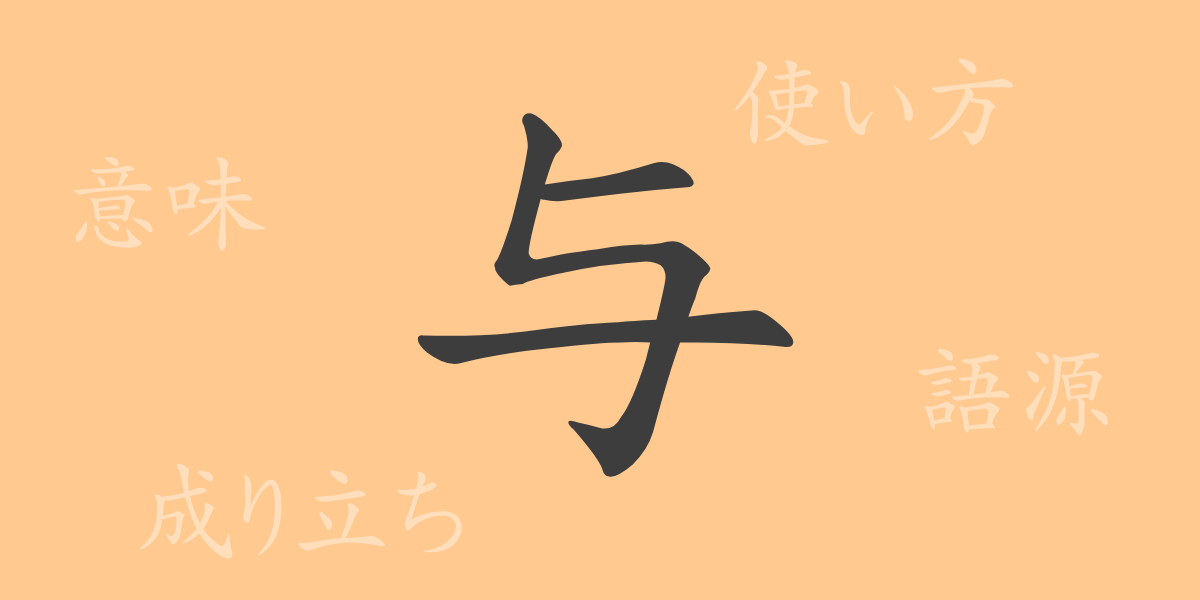The kanji (漢字) characters that make up the Japanese language each have their own unique history and meaning, enriching the world of words. One such character, “与” (ヨ, yo), is deeply rooted in the daily life and culture of the Japanese people. In this article, we will explore the origins, meanings, and uses of “与” (ヨ, yo), as well as delve into its idiomatic expressions and proverbs, uncovering its charm.
Origins of 与 (ヨ, yo)
The kanji (漢字) “与” (ヨ, yo) has its origins in ancient Chinese oracle bone script. It originally depicted “the act of handing something over from one’s hand,” and came to mean giving or being involved. Over time, its form evolved into the current “与” (ヨ, yo). This character is used in a variety of expressions, not only to denote the act of giving but also to mean participating or being related.
Meanings and Uses of 与 (ヨ, yo)
The kanji (漢字) “与” (ヨ, yo) carries meanings such as “to give,” “to support,” and “to be involved.” It is primarily used to indicate actions like giving, participating, or being involved. It also includes nuances of affecting the person or matter in question. Specific uses include terms like 与党 (ヨトウ, yotou – the ruling party), 与える (アタエル, ataeru – to give something to someone), and 関与 (カンヨ, kanyo – to participate in something).
Readings, Stroke Count, and Radical of 与 (ヨ, yo)
The kanji (漢字) “与” (ヨ, yo) has various readings in Japanese.
- Readings: The on’yomi (音読み, Chinese reading) is “ヨ” (yo), and the kun’yomi (訓読み, Japanese reading) includes “アタエル” (ataeru), “アズカル” (azukaru), and “トモニ” (tomoni).
- Stroke count: 与 (ヨ, yo) has a total of 3 strokes.
- Radical: The radical is “ノ” (no), but “与” (ヨ, yo) itself also functions as a radical.
Idioms, Expressions, and Proverbs Using 与 (ヨ, yo)
There are many idioms, expressions, and proverbs in Japanese that include “与” (ヨ, yo). For example, “与する” (クミスル, kumisuru) means to agree, and “与党” (ヨトウ, yotou) refers to a political party that supports the government. “与える” (アタエル, ataeru) means the act of giving something to someone, and “関与する” (カンヨスル, kanyosuru) indicates being deeply involved in something. A proverb such as “与えられた場所で咲きなさい” (アタエラレタバショデサキナサイ, ataerareta basho de sakinasai) teaches the lesson of making the best of one’s given environment.
Summary of 与 (ヨ, yo)
Through this article, we have deepened our understanding of the history behind the kanji (漢字) “与” (ヨ, yo), its diverse meanings, and its uses. Despite its simplicity and few strokes, “与” (ヨ, yo) is essential in Japanese communication, representing important social actions such as giving, participating, and being involved. As seen in idioms, expressions, and proverbs, “与” (ヨ, yo) is used in many contexts, reaffirming its value.

























